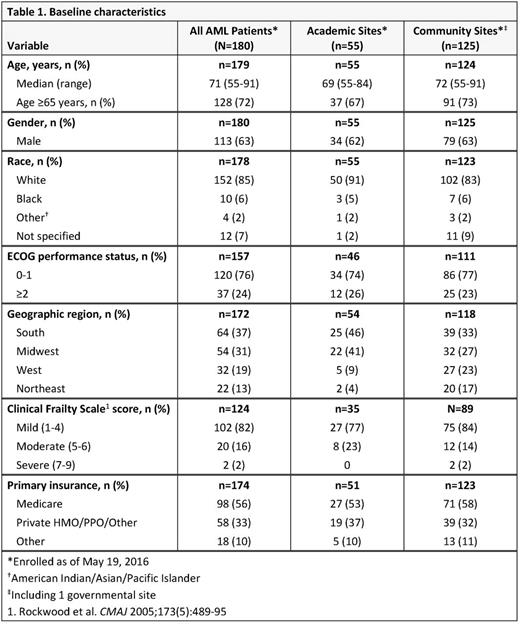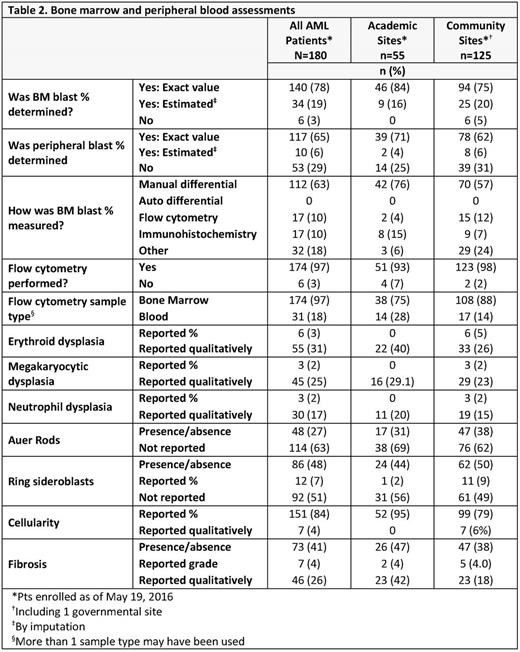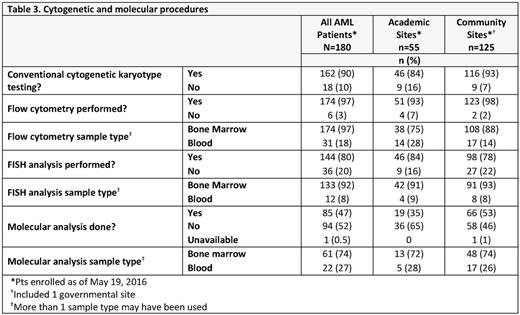Abstract
Background: The diagnosis of AML requires an integrated approach of clinical, morphologic, cytogenetic, and molecular assessments. The CONNECT MDS/AML Disease Registry (NCT01688011) is a prospective, longitudinal, multicenter, observational cohort study of patients (pts) in the United States with newly diagnosed AML, MDS, or idiopathic cytopenia of undetermined significance, designed to evaluate diagnostic and treatment (Tx) patterns, clinical and pt-reported outcomes, and correlative data, such as genetic mutations. This investigation was performed to assess how pts with AML are diagnosed at community and academic sites and compare how these diagnostic practices align with WHO 2008 recommendations for AML.
Methods: Pt enrollment began in December, 2013 and will continue until ~1500 pts from ~150 US sites are enrolled. Target enrollment for the AML cohort is 400 pts. To best capture the typical distribution of clinical practice settings in which AML pts are treated, ~80% of the sites will be community-based and ~20% will be academic institutions (ie, affiliated with a medical school). Pts aged ≥55 years (yrs) with newly diagnosed AML (excluding acute promyelocytic leukemia) are eligible. All decisions regarding pt care (Tx, testing) are determined by the study clinician, as the disease registry is non-interventional. AML diagnosis is confirmed by independent central review of all available diagnostic test reports, including bone marrow (BM) aspirates and biopsies, cytogenetics, molecular testing, and laboratory results. Diagnostic procedures are recorded in an electronic data capture system. Pt data will be entered quarterly for up to 8 years of follow-up.
Results: Between December 12, 2013 and May 19, 2016, 180 AML pts have enrolled in the registry from 73 sites; 125 pts (69%) enrolled at a community site (including 1 governmental site) and 55 pts (31%) enrolled at an academic center. Median age of all pts was 71 yrs (range 55-91), with 72% of pts aged ≥65 yrs (Table 1). Blast percentages were reported in 97% of cases, mainly in BM, although peripheral blood blasts were also assessed for 71% of pts (Table 2). Manual differential blast count was reported for 63% of pts, and flow cytometry and immunohistochemistry were used to determine blast counts for 10% of pts each. Immunophenotyping by flow cytometry was reported for 97% of pts. Erythroid, megakaryocytic, or neutrophilic dysplasia, and presence or absence of Auer rods, ring sideroblasts, or fibrosis were reported for <50% of all pts (Table 2). Conventional karyotyping was performed for 90% of pts and FISH testing was reported for 80% of pts (Table 3). Mutation testing was reported for 85 pts (47%).
Conclusions: The ongoing prospective CONNECT MDS/AML registry is uniquely positioned to assess current clinical practice patterns in AML. Flow cytometry and conventional karyotyping were done in most cases; however, manual blast count was missing for 37% of AML pt samples at diagnosis. Instead, ~10% of blasts counts were evaluated by flow cytometry or immunohistochemistry, and ~18% by 'other' means (ie, blast count estimations). Flow cytometry for blast enumeration is discouraged in WHO 2008 recommendations, as it may both under- and overestimate counts. Despite a 90% rate of conventional karyotyping, FISH testing was reported for 80% of pts, suggesting FISH may be used more than is necessary. Mutation testing was reported for approximately one-half of pts, which may reflect a lack of testing, a lag in mutational test reporting, or a combination of both. Diagnostic practices for AML pts enrolled thus far appear to be guided by WHO 2008 recommendations; awareness of updated recommendations may change diagnostic patterns as new AML pts enter the CONNECT MDS/AML registry.
George:Celgene: Consultancy, Membership on an entity's Board of Directors or advisory committees, Research Funding; Allakos: Research Funding; Allakos: Research Funding; Blueprint Medicines: Consultancy; Novartis: Consultancy; Seattle Genetics: Consultancy, Research Funding; Incyte: Consultancy; GLG: Consultancy; Wiley Blackwell: Consultancy; American Registry of Pathology: Patents & Royalties; Wolters Kluwer: Patents & Royalties; UpToDate: Patents & Royalties. Erba:Sunesis: Consultancy; Novartis: Consultancy, Speakers Bureau; Celator: Research Funding; Ariad: Consultancy; Jannsen: Consultancy, Research Funding; Juno: Research Funding; Astellas: Research Funding; Incyte: Consultancy, DSMB, Speakers Bureau; Agios: Research Funding; Pfizer: Consultancy; Gylcomimetics: Other: DSMB; Millennium Pharmaceuticals, Inc.: Research Funding; Celgene: Consultancy, Speakers Bureau; Seattle Genetics: Consultancy, Research Funding; Amgen: Consultancy, Research Funding; Daiichi Sankyo: Consultancy. Steensma:Amgen: Consultancy; Ariad: Equity Ownership; Millenium/Takeda: Consultancy; Janssen: Consultancy; Celgene: Consultancy; Genoptix: Consultancy. Pollyea:Alexion: Other: advisory board; Ariad: Other: advisory board; Celgene: Other: advisory board, Research Funding; Glycomimetics: Other: DSMB member; Pfizer: Other: advisory board, Research Funding. Abedi:Celgene: Consultancy. Bejar:Genoptix: Consultancy. Grinblatt:Celgene Corporation: Consultancy, Speakers Bureau. Komrokji:Novartis: Consultancy, Speakers Bureau; Celgene: Membership on an entity's Board of Directors or advisory committees, Research Funding. Revicki:Celgene: Consultancy. Roboz:Cellectis: Research Funding; Agios, Amgen, Amphivena, Astex, AstraZeneca, Boehringer Ingelheim, Celator, Celgene, Genoptix, Janssen, Juno, MEI Pharma, MedImmune, Novartis, Onconova, Pfizer, Roche/Genentech, Sunesis, Teva: Consultancy. Savona:TG Therapeutics: Research Funding; Takeda: Research Funding; Amgen Inc.: Membership on an entity's Board of Directors or advisory committees; Celgene: Membership on an entity's Board of Directors or advisory committees; Incyte: Membership on an entity's Board of Directors or advisory committees, Research Funding; Gilead: Membership on an entity's Board of Directors or advisory committees; Sunesis: Research Funding; Ariad: Membership on an entity's Board of Directors or advisory committees. Scott:Celgene: Consultancy, Membership on an entity's Board of Directors or advisory committees. Sekeres:Millenium/Takeda: Membership on an entity's Board of Directors or advisory committees; Celgene: Membership on an entity's Board of Directors or advisory committees. Thompson:VIA Oncology: Membership on an entity's Board of Directors or advisory committees; Takeda: Membership on an entity's Board of Directors or advisory committees, Other: Multiple Myeloma International Registry; Celgene: Membership on an entity's Board of Directors or advisory committees, Other: MDS/AML Registry; Doximity: Equity Ownership, Membership on an entity's Board of Directors or advisory committees; AIM Specialty Health: Membership on an entity's Board of Directors or advisory committees; Bristol-Myers Squibb: Membership on an entity's Board of Directors or advisory committees. Fliss:Celgene Corporation: Employment, Equity Ownership. Swern:Celgene: Employment, Equity Ownership. Nifenecker:Celgene: Employment, Equity Ownership. Kiselev:Celgene: Employment, Equity Ownership. Sugrue:Celgene Corporation: Employment, Equity Ownership. Foucar:Celgene: Membership on an entity's Board of Directors or advisory committees; ASCP press: Other: Book royalties; Elsevier: Other: Book royalties; Lippincott WW: Other: Book royalties.
Author notes
Asterisk with author names denotes non-ASH members.




This feature is available to Subscribers Only
Sign In or Create an Account Close Modal